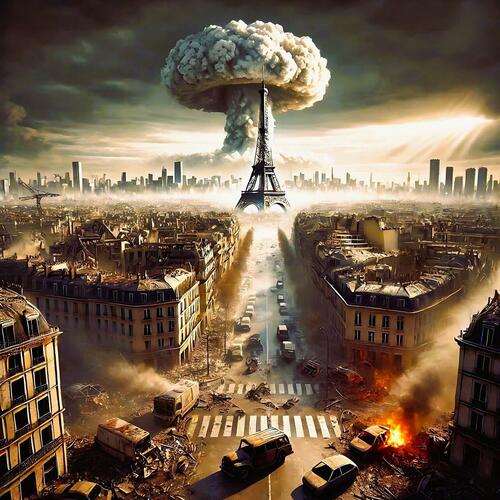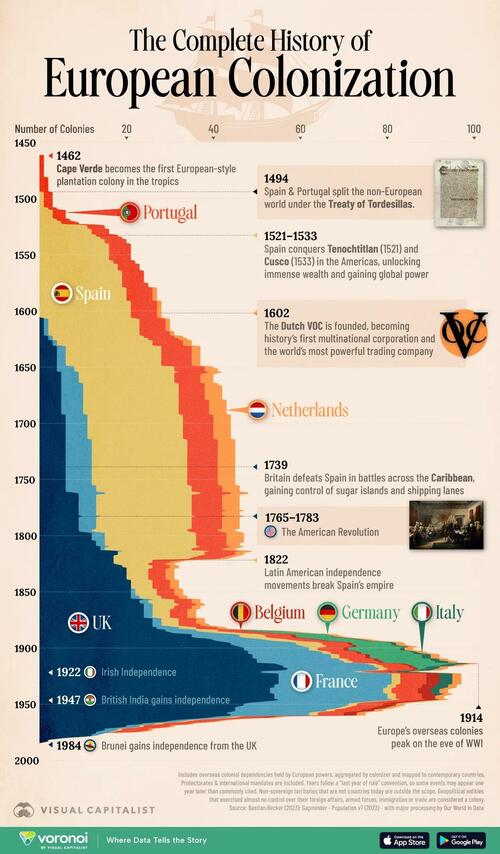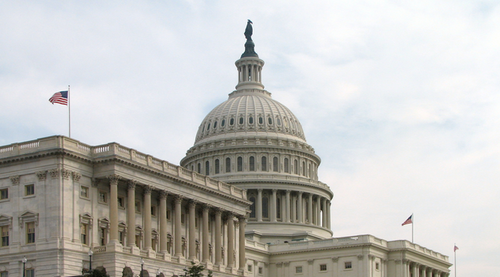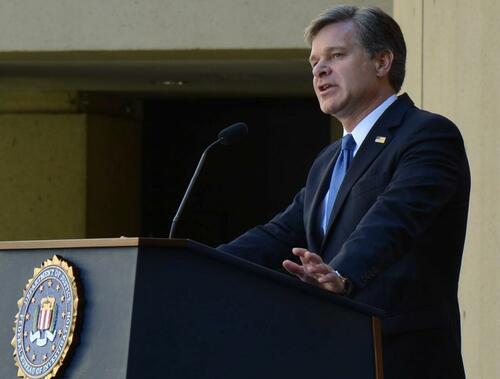Authored by Michael Snyder via The End of The American Dream blog,
If there is going to be peace, why are we witnessing the largest military buildup in Europe since the end of the Cold War? When it comes to the major players on the geopolitical stage, it is far more important to watch what they do than it is to listen to what they say. And right now the actions that the major European powers are taking are telling us that they are preparing for a huge war with Russia.

Ukraine was supposed to be the final piece of the puzzle for the European Union.
It is an enormous chunk of territory, and it is absolutely teeming with natural resources.
For most European leaders, it is unthinkable that Ukraine could be allowed to fall back into Russian hands, but at the moment more Ukrainian territory is being taken by the Russians with each passing day.
In fact, it is being reported that the city of Seversk has just fallen…
Valery Gerasimov, Chief of the General Staff of the Russian Armed Forces, said that the “Southern” group of troops had taken control of the city of Seversk in the DPR.
“The city of Seversk has been liberated,” Gerasimov said during a report to Russian President Vladimir Putin.
Every time the Russians move forward, European leaders feel even more pressure to send troops into Ukraine.
Apparently the British already have at least some soldiers in Ukraine, because one of them just died…
The British soldier who died in Ukraine on Tuesday has been named as L/Cpl George Hooley, 28, of the Parachute regiment.
Keir Starmer told the Commons on Wednesday that Hooley had died in a “tragic accident” away from the frontlines while watching a test of “a new defensive capability” with members of the Ukrainian military.
“His life was full of courage and determination,” Starmer said. “He served our country with honour and distinction around the world in the cause of freedom and democracy, including as part of the small number of British personnel in Ukraine.”
Did you notice that Starmer was purposely vague about how many British troops are in Ukraine?
Is it 100?
Is it 1,000?
Is it 10,000?
We would like to know.
Meanwhile, we are being told that plans are in the works to significantly expand the size of the French army…
France will this week become the latest EU country to set out plans to expand its army, with Emmanuel Macron expected to announce on Thursday that military service will be restored – albeit on a voluntary basis – nearly 30 years after the end of conscription.
In the face of Russia’s military threat and uncertainty over the US’s commitment to defending its transatlantic allies, Europe is rushing to bolster its defence industry and its deployment capability after radically cutting them back since the cold war.
Why would the French need a much larger army if a peace deal is going to be negotiated with the Russians?
And why have French hospitals been instructed to prepare for tens of thousands of casualties?…
French hospitals have been told to prepare a potential armed conflict in Europe by next year, local media reported.
In a letter sent to regional health agencies, revealed by Le Canard Enchaîné , the Ministry of Health asked hospitals to prepare for a “major (military) engagement” by March 2026.
The newspaper warned that between 10,000 and 50,000 men could be expected in hospitals over a period of 10 to 180 days.
Something doesn’t add up.
We are being told one thing, but plans are being made for something else to happen instead.
Other European nations are also making plans for large scale military conflict…
Denmark’s conscription system was extended to women and lengthened to 11 months from four in June. Estonia has universal male conscription, while Latvia and Lithuania, like Denmark, select conscripts by lottery if there are not enough volunteers.
Elsewhere, Croatia, which abolished mandatory military service 17 years ago, recently restored conscription, while Poland is working on a plan to prepare large-scale military training for every adult male in an effort to double the size of its army.
Is it just a coincidence that all of these countries are suddenly makes these moves in unison?
In Germany, military spending is about to go soaring into uncharted territory…
At a moment the Russia-Ukraine war grinds on, and as Trump-led efforts to find peace have been frustrated – largely as Zelensky and his backers have balked at agreeing to any territorial compromise as the bases of a deal – Germany is busy transforming its military with an aim to boost Bundeswehr numbers and meet NATO targets.
That news dominated headlines last week, but added to this Bloombergis newly reporting Tuesday that the troop expansion will coincide with a major tech and armament expansion, given lawmakers are expected to approve a record €52 billion (about $61 billion) in military procurement contracts next week.
This will mark the largest single-year investment in defense equipment in the country’s history, underscoring Berlin’s renewed push to modernize its armed forces amid the growing European standoff with Russia.
As for 2025 numbers, prior approvals brought total defense commitments for this year to above €33 billion. So next year’s could more than double, based on the new projected figures.
If there is going to be peace with Russia, this level of military spending makes no sense at all.
But if there is going to be war with Russia, this level of military spending is easily explained.
On Thursday, NATO Chief Mark Rutte ominously warned that “we must be prepared for the scale of war our grandparents and great grandparents endured”…
NATO Chief Mark Rutte urged member countries to do more to prepare for the possibility of large-scale war, warning that Russia may be ready to attack the alliance within five years.
“We are Russia’s next target. And we are already in harm’s way,” Rutte said on Thursday during a speech in Berlin. “Russia has brought war back to Europe, and we must be prepared for the scale of war our grandparents and great grandparents endured.”
Although he welcomed the decision by NATO members to increase overall military spending to 5 percent of gross domestic product annually by 2035, Rutte argued more needed to be done, saying alliance members must shift to a “wartime mindset.”
What wars did our grandparents and our great-grandparents endure?
Obviously he was referring to World War I and World War II.
In other words, he was telling us that we need to get ready for World War III.
But the Russians have told us over and over again that they have no intention of going to war with Europe. In fact, Russian Foreign Minister Sergei Lavrov used those exact words earlier this week. But he did warn that there are a couple of red lines that will force the Russians to respond if they are crossed…
“As the President [Putin] emphasised, we have no intention of going to war with Europe,” said Lavrov.
“We have no such intention.
“But we will respond to any hostile steps, including the deployment of European military contingents in Ukraine and the expropriation of Russian assets.”
Sending large numbers of European troops into Ukraine would be a really foolish thing to do, because the Russians would begin shooting at them.
And once that starts happening, we will be perilously close to nuclear conflict.
This is something that they talk about on Russian television all the time. Commenting on the confirmed death of a British soldier in Ukraine, one of the most prominent voices on Russian television boldly declared that “a nuclear strike on Britain is inevitable”…
Leading Kremlin propagandist hawk, Vladimir Solovyov, told viewers on his nightly show: “Now a nuclear strike on Britain is inevitable….” Historian Andrey Sidorov, another Putin cheerleader, said: “This incident should be considered a casus belli, when the British Ministry of Defence officially acknowledged the death of its military personnel on active duty on Ukrainian territory.” He demanded the Russian foreign ministry summon British ambassador Nigel Casey or a chargé d’affaires “to explain what an active-duty military officer was doing there”.
That is crazy talk.
But this is how they actually see the world.
We should be trying to avoid a worst case scenario while we still can.
The expropriation of Russian assets is another red line for the Russians, and it appears that the Europeans are determined to cross it as well…
Currently EU member states are rapidly advancing a plan to permanently freeze as much as €210 billion ($244.38 billion) in Russian state assets to finance Ukraine for at least the next two years. European Commission President Ursula von der Leyen is seeking to use a loophole to rush this through, based on invoking emergency powers to sanction the frozen assets on a permanent basis, instead of holding the funds based on current six-month renewals, which requires unanimous agreement from all member states.
The plan would see €90 billion (roughly $104.71 billion) released over the next two years. Von der Leyen’s scheme would allow for the plan to pass merely with a qualified majority, and so couldn’t be derailed by just a lone veto. Nations like Germany and Spain have already signaled their support.
This is a really bad idea.
But the Europeans are apparently going to do it anyway.
Meanwhile, the U.S. continues to provoke the Russians by messing with their closest ally in South America.
Yesterday, I posted an article about the oil tanker that the U.S. just seized as it was approaching Venezuela.
On Thursday, Russian Foreign Minister Sergey Lavrov wanted an explanation…
Russian Foreign Minister Sergey Lavrov on Thursday demanded that the Trump administration explain why a Venezuelan oil tanker was seized by U.S. forces.
“I really hope that the United States, although they consider themselves entitled to conduct such operations, will somehow explain, out of respect for other members of the world community, what facts led them to take such actions,” he said during an ambassadors’ roundtable on the Ukrainian crisis resolution.
And Russian President Vladimir Putin made it a point to publicly demonstrate his support for Venezuelan President Nicolas Maduro…
Russian President Vladimir Putin spoke to Venezuelan President Nicolas Maduro by phone on Thursday to reassure him of Moscow’s support for his government, shortly after the United States seized a large oil tanker off Venezuela’s coast.
Maduro has been under increasing pressure from President Donald Trump’s administration to leave office, with the U.S. conducting increasingly large military build-up in the Caribbean. Tensions escalated on Wednesday when the U.S. seized the tanker, sparking furious outcry from Venezuela.
The Kremlin said that Putin and Maduro had discussed a strategic partnership agreement and working together on several joint projects related to the economy and energy sector.
A regime change operation in Venezuela would do severe damage to our relationship with the Russians.
But officials in Washington don’t seem to care.
In fact, the White House has announced that the U.S. may soon seize even more oil tankers…
President Donald Trump is willing to seize more oil tankers off the coast of Venezuela, a White House official told CNBC on Thursday.
The U.S. seized a tanker on Wednesday that had allegedly transported oil from Venezuela to Iran. The action comes as Trump escalates pressure on President Nicolás Maduro.
I feel like I am watching a slow-motion train wreck that I am unable to stop.
I have been writing about these wars for so long, and now they are unfolding right in front of our eyes.
Personally, I have no idea why so many prominent voices out there are cheering for war.
War is not a game.
And that is especially true when nuclear weapons are involved.
The fate of billions of people is hanging in the balance, and we must step back from the brink before it is too late.
Michael’s new book entitled “10 Prophetic Events That Are Coming Next” is available in paperback and for the Kindle on Amazon.com, and you can subscribe to his Substack newsletter at michaeltsnyder.substack.com.














